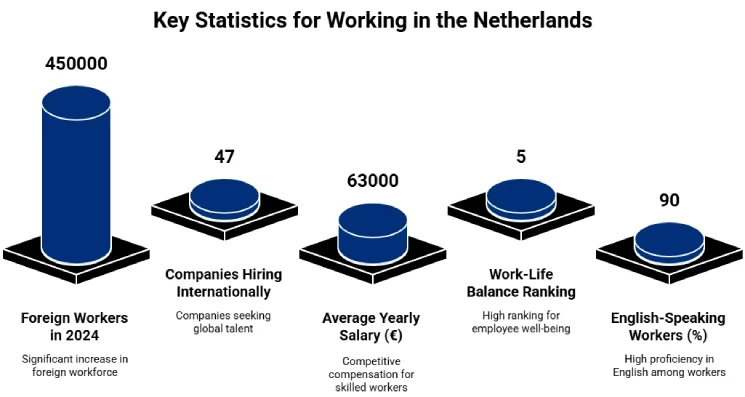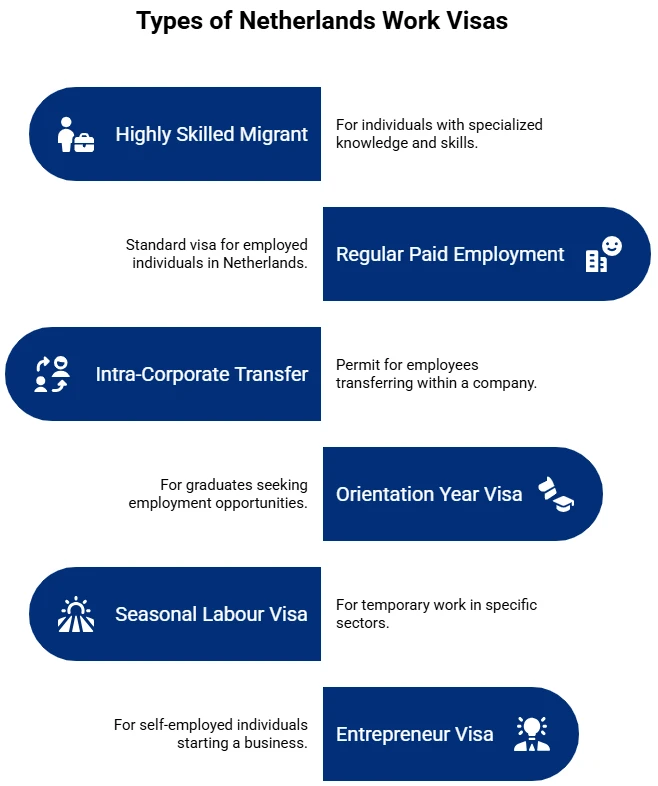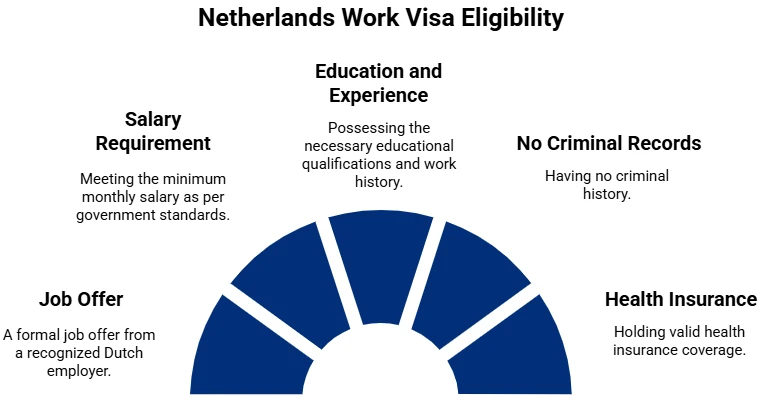Thinking about working in the Netherlands? The country is a great place for skilled Canadians due to its strong economy, presence of global companies, and excellent living conditions. If you want to get a work visa for the Netherlands in 2025, here's what you should know.

*Want guidance to apply for the Netherlands Work Visa? Sign up with Y-Axis for comprehensive support with the process.
A Netherlands Work Visa enables non-EU/EEA citizens, such as Canadians, to reside and be employed in the Netherlands legally. Needed for stays over 90 days, it typically comes with a residence permit. Applicants need a job offer from a Dutch employer that the Immigration and Naturalisation Service (IND) recognizes as a sponsor.
International professionals prefer working Netherlands for the reasons given below.
*Looking for assistance to apply for work overseas? Y-Axis is here to guide you with the process.
The benefits of a Netherlands Work Visa are given below.
Netherlands offers multiple types of Netherlands Work Visas. Some of the popular Dutch work visas are:

The Dutch Highly Skilled Migrant Visa is for professionals from outside the EU/EEA, like Canadians, who have a job offer from a Dutch employer. This employer must be recognized as a sponsor by the Immigration and Naturalisation Service (IND). The visa enables skilled workers to reside and be employed in the Netherlands for jobs that need special skills.
Salary requirements for 2026:
*Need guidance to search for suitable jobs overseas? Let Y-Axis guide you with the process.
The Netherlands Regular Paid Employment Visa is designed for people from outside the EU/EEA, such as Canadians, who want to work in the Netherlands in jobs that don't meet the requirements for the Highly Skilled Migrant program. This visa lets you live and be employed in the country if you have a job offer from a Dutch company.
The Netherlands Intra-Corporate Transfer (ICT) Permit allows people from outside the EU/EEA, such as Canadians, to move from a branch of a multinational company in another country to the company's office in the Netherlands. This permit is intended for managers, specialists, or trainees who are temporarily assigned to work in the Netherlands.
The Netherlands Orientation Year Visa (Zoekjaar) is a residence permit that allows international graduates and highly educated people, including Canadians, to stay in the Netherlands for up to 12 months to seek work or begin a business.
The Netherlands Seasonal Labor Visa allows non-EU/EEA citizens, including Canadians, to take on temporary jobs in agriculture, horticulture, and floriculture. This visa allows stays of up to 24 weeks a year, fitting seasonal work like fruit picking, greenhouse work, and flower growing. Employers must get a work permit (TWV) first, showing they couldn't find suitable EU/EEA workers. Beginning in 2026, seasonal workers must make at least the Dutch minimum wage (€1,995 monthly for full-time hours).
The Netherlands Entrepreneur and Self-Employment Visa serves non-EU/EEA citizens, including Canadians, seeking to launch a business or freelance in the nation. This visa permits legal residence and business operations within the country.
Eligibility requires that the business idea offer a substantial benefit to the Dutch economy, evaluated on factors like innovation, job creation, and investment. A detailed business plan and proof of a minimum monthly income of €1,334 (2026) are necessary. The initial visa duration is two years, with extension options.
The eligibility criteria for a Netherland work visa are given below.

The documents required to apply for a Netherlands Work Visa are given below.
The application process to apply for a Netherlands Work Visa is given below.
Step 1: To work in the Netherlands, first get a job offer from a Dutch employer that the Immigration and Naturalisation Service (IND) recognizes as a sponsor.
Step 2: The employer then applies to the IND for your combined residence and work permit.
Step 3: You will get a decision within the standard time frame for your visa type.
Step 4: If needed, apply for a long-stay entry visa (MVV) at the Dutch embassy or consulate in Canada.
Step 5: After arriving in the Netherlands, register with your local municipality to get your residence permit card.
.webp)
Detailed information about the fees for Netherlands Work Visas is given below.
| Visa Type | Fee (EUR) |
| Highly Skilled Migrant Visa | € 350 |
| Regular Paid Employment Visa | € 350 |
| Intra-Corporate Transfer Permit (ICT) | € 350 |
| Orientation Year (Zoekjaar) Visa | € 215 |
| Entrepreneur and Self-Employment Visa | € 1,557 |
| Long-Stay Visa (MVV) | € 174 |
Detailed information about the processing times for Netherlands Work Visas is given below.
| Visa Type | Processing Time |
| Highly Skilled Migrant Visa | 2–4 weeks |
| Regular Paid Employment Visa | 8–12 weeks |
| Intra-Corporate Transfer Permit (ICT) | 2–4 weeks |
| Orientation Year (Zoekjaar) Visa | 2–4 weeks |
| Entrepreneur and Self-Employment Visa | 90 days |
Dutch work visas usually last from one to five years, varying with the visa and job contract. If you want to keep working after your current visa is done, you can ask for a renewal if you still qualify.
The possible challenges and tips to have a successful Netherlands work visa are given below.
| Challenge | Tip for a Successful Application |
| Strict salary thresholds for certain visa types | Apply for roles under the Highly Skilled Migrant scheme where salary criteria are clearly defined. |
| Incomplete or incorrect documentation | Double-check all documents and ensure translations meet IND requirements before submission. |
| Delays in the employer sponsorship process | Choose employers recognized as sponsors by the IND to fast-track your application. |
| Long processing times for regular permits | Submit your application well in advance and track progress through the IND portal. |
| Limited knowledge of Dutch immigration rules | Consult official IND resources or immigration experts to avoid mistakes and improve approval chances. |
Y-Axis is a global immigration and career consultancy that has assisted many professionals in working and settling overseas. We provide expert advice and complete support to simplify the Netherlands work permit process for Canadians and reduce their stress.
Our services include:
A Netherlands work visa lets people from outside the EU/EEA, such as Canadians, live and work there legally. If you plan to work for more than 90 days, you'll need this visa, which usually comes with a residence permit. To get one, you must have a job offer from a Dutch employer that the Immigration and Naturalisation Service (IND) has approved as a sponsor. This visa makes sure you follow Dutch immigration laws and lets you use healthcare, social security, and travel within the Schengen area.
Yes, Canadians can apply for a Netherlands work visa, provided them meet the eligibility criteria. To work in the Netherlands, individuals need a job offer from an employer recognized by the Immigration and Naturalisation Service (IND). Usually, the employer applies for a combined residence and work permit for the employee. Fields such as IT, engineering, and healthcare often seek Canadian workers. For stays exceeding 90 days, a long-stay visa (MVV) could be a requirement. After the application is approved, individuals must register with the local municipality to get their residence permit.
The Netherlands offers multiple work visa options for Canadians, such as:
Each visa has its criteria, costs, and length of stay.
To be eligible for the Highly Skilled Migrant Visa (2026), individuals must meet specific gross monthly income criteria: €5,331 for those 30 years or older, €3,909 for those under 30, and €2,801 for those who graduated from a Dutch university. Salary expectations for other visa categories depend on the position and the employer. The Dutch government revises these amounts each year to reflect current economic realities. Meeting the base pay is needed to get a visa.
Processing times for a Netherlands Work Visa depend on the visa type you have applied for. Detailed information is given below.
| Visa Type | Processing Time |
|---|---|
| Highly Skilled Migrant Visa | 2–4 weeks |
| Regular Paid Employment Visa | 8–12 weeks |
| Intra-Corporate Transfer Permit (ICT) | 2–4 weeks |
| Orientation Year (Zoekjaar) Visa | 2–4 weeks |
| Entrepreneur and Self-Employment Visa | 90 days |
To apply for a Netherlands Work Visa, you must provide the following documents:
All documents might have to be translated into Dutch, English, German, or French and legalized.
Yes, Canada-based professionals applying can include family members in the Netherlands Work Visa. Professionals based in Canada who are applying for a Netherlands Work Visa have the option to include family members in their application. This process allows spouses, partners, and children under the age of 18 to reside with the primary visa holder in the Netherlands. Family members are granted residence permits, giving them access to healthcare, education, and, often, the ability to work. Applicants must provide documentation that they can financially support their dependents and have appropriate accommodation.
Detailed information about the cost of various types of Netherlands Work Visas is given below.
| Visa Type | Fee (EUR) |
|---|---|
| Highly Skilled Migrant Visa | € 350 |
| Regular Paid Employment Visa | € 350 |
| Intra-Corporate Transfer Permit (ICT) | € 350 |
| Orientation Year (Zoekjaar) Visa | € 215 |
| Entrepreneur and Self-Employment Visa | € 1,557 |
| Long-Stay Visa (MVV) | € 174 |
Yes, you can switch jobs in the Netherlands while on a work visa, as long as certain requirements are met. Your next employer needs to be an official sponsor with the Immigration and Naturalisation Service (IND) and inform the IND about your job change. For those with a Highly Skilled Migrant Visa, the process is more straightforward if the new employer is on the IND’s list of recognized sponsors. If you have a different kind of work visa, you might need to apply for a new residence and work permit before starting the new job to follow Dutch immigration laws.